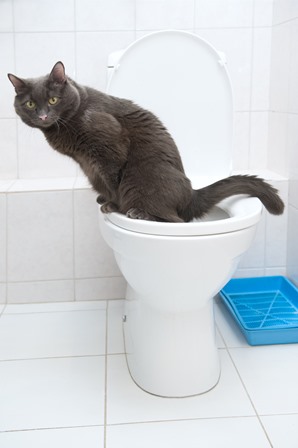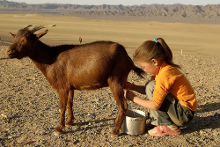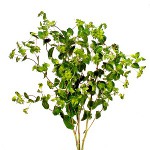Cats and dogs fed a natural, raw diet almost never get constipation. The only part of the natural diet that may sometimes cause hard stools are the raw bones. But this doesn’t  mean you ought to not feed raw bones. The benefit is much higher than the detriment. And the increase in stool density caused by eating bone isn’t enough to constitute severe constipation. You’ll just notice small, hard poops.
mean you ought to not feed raw bones. The benefit is much higher than the detriment. And the increase in stool density caused by eating bone isn’t enough to constitute severe constipation. You’ll just notice small, hard poops.
Substantial constipation is usually caused by poor diet, not enough exercise, holding in stool because of household conditions, a bowel obstruction, abnormally large feces, or dehydration. Aluminum toxicity may be the cause if rectal muscles seem too weak to be performing their function.
If the treatments below fail to relieve the constipation, a visit to a holistic veterinarian may be necessary in case there is an obstruction or an underlying disorder such as kidney disease or hypothyroidism.
Herbal and Naturopathic Help
 First off, if your cat is constipated, make sure that you are cleaning the litter box every day. We do not approve of the clumpable litters that are popular nowadays. People tend to just scoop out the lumps and leave loads of bacteria behind, in the sand, to fester for days, weeks, even months.
First off, if your cat is constipated, make sure that you are cleaning the litter box every day. We do not approve of the clumpable litters that are popular nowadays. People tend to just scoop out the lumps and leave loads of bacteria behind, in the sand, to fester for days, weeks, even months.
The litter box method we use is one we picked up at veterinary hospitals. Instead of filling a large pan full of litter and either changing it each day or just taking out the lumps, place some newspaper or a liner in the clean pan, and then put a sifting of litter on top. Each time your cat defecates, grab up the whole mess in a bundle, and replace it with new paper and new litter. This method is very easy, very clean, and very efficient.
Keeping a sanitary litter box is pertinent to this section because a cat may have developed a habit of holding in feces if the litter box frequently stinks. Remember, too, that a cat’s nose is more sensitive than yours. The same can happen with dogs who aren’t let out enough.
It’s important to feed your pet a natural diet that includes fresh vegetables for bulk. It’s also very important that your pets get plenty of exercise and ample opportunity to relieve themselves.
For constipation, there are a number of things you can add to your pet’s meal. Bran and psyllium will help the stools hold moisture. Milk products can act as a natural laxative in dogs and cats. You may also want to add additional minced vegetables, prunes, coconut, or tahini. All have been known to help. As well, mineral oil is a useful laxative and lubricant because it’s not absorbed by your pet’s body like vegetable and fish oils are. Only give about half a teaspoon per twenty-five pounds of body weight once a day for no longer than a week.
in dogs and cats. You may also want to add additional minced vegetables, prunes, coconut, or tahini. All have been known to help. As well, mineral oil is a useful laxative and lubricant because it’s not absorbed by your pet’s body like vegetable and fish oils are. Only give about half a teaspoon per twenty-five pounds of body weight once a day for no longer than a week.
Make sure your pet has plenty of filtered water available at all times, and that dishes are made from stainless steel, glass or quality ceramics with no toxic paints or shellacs. If you suspect aluminum poisoning, remove all sources of aluminum, including cooking utensils, and consult a holistic veterinarian. Also consult a veterinarian if constipation occurs frequently or lasts longer than three days. It’s important to see a vet who is properly educated in nutrition because a conventional veterinarian may put your pet on the commercial food he or she has been trained to support by his or her vet school’s sponsor.
Homeopathy
 If your pet is straining to produce small amounts of hard feces without relief, and seems emotionally upset or standoffish, give Nux vomica 6c every twelve hours for three days.
If your pet is straining to produce small amounts of hard feces without relief, and seems emotionally upset or standoffish, give Nux vomica 6c every twelve hours for three days.
If weak rectal muscles seem to be an issue, and fecal matter is slipping back into the rectum, give Silica 6c every twelve hours for three days.